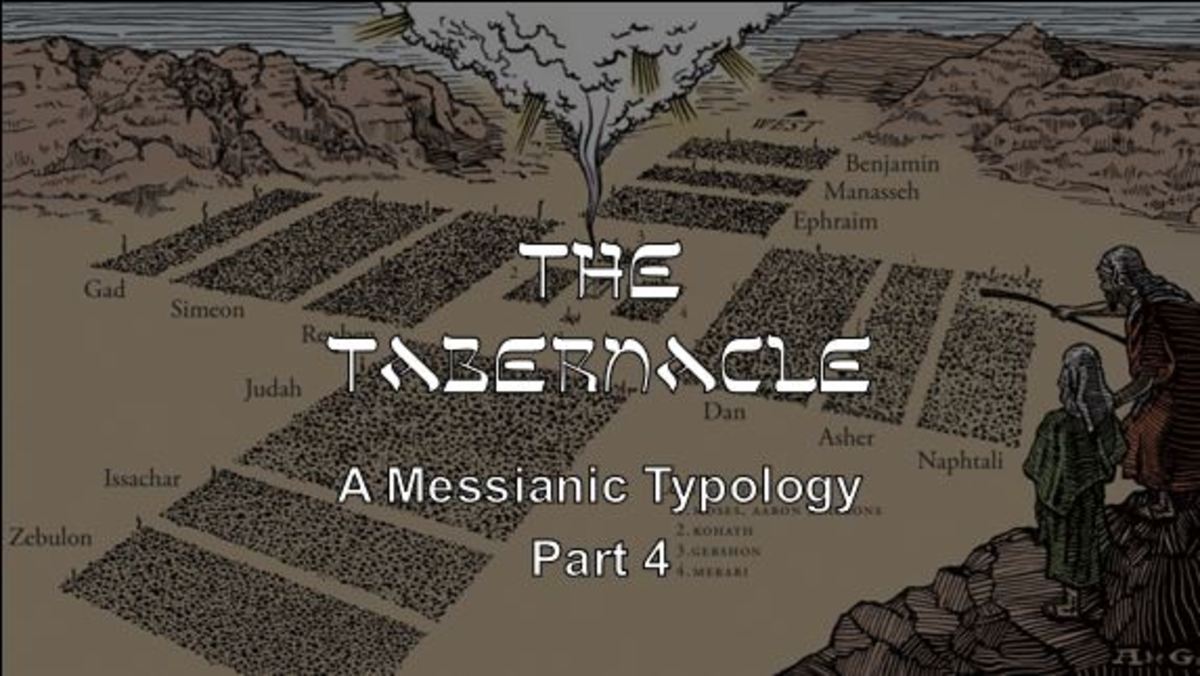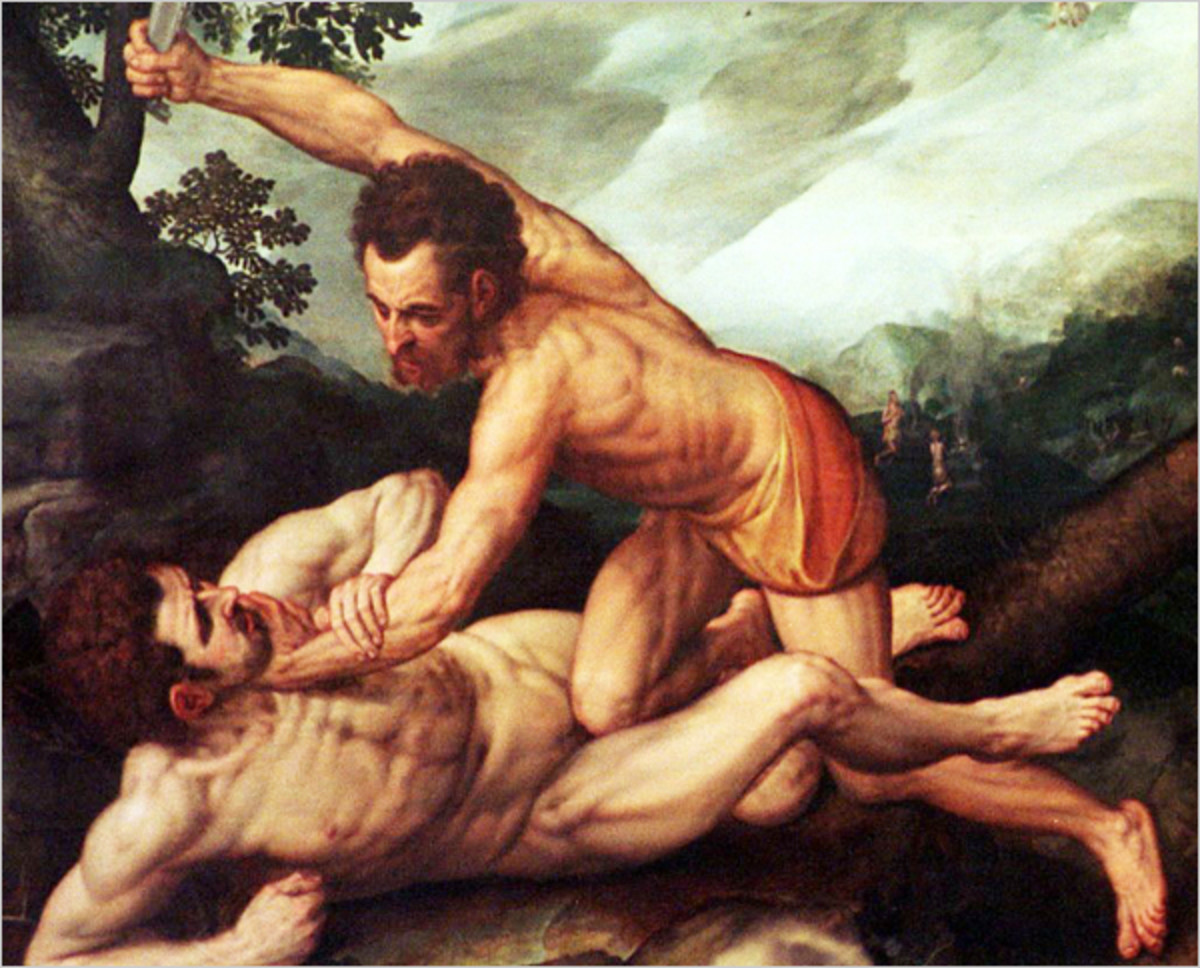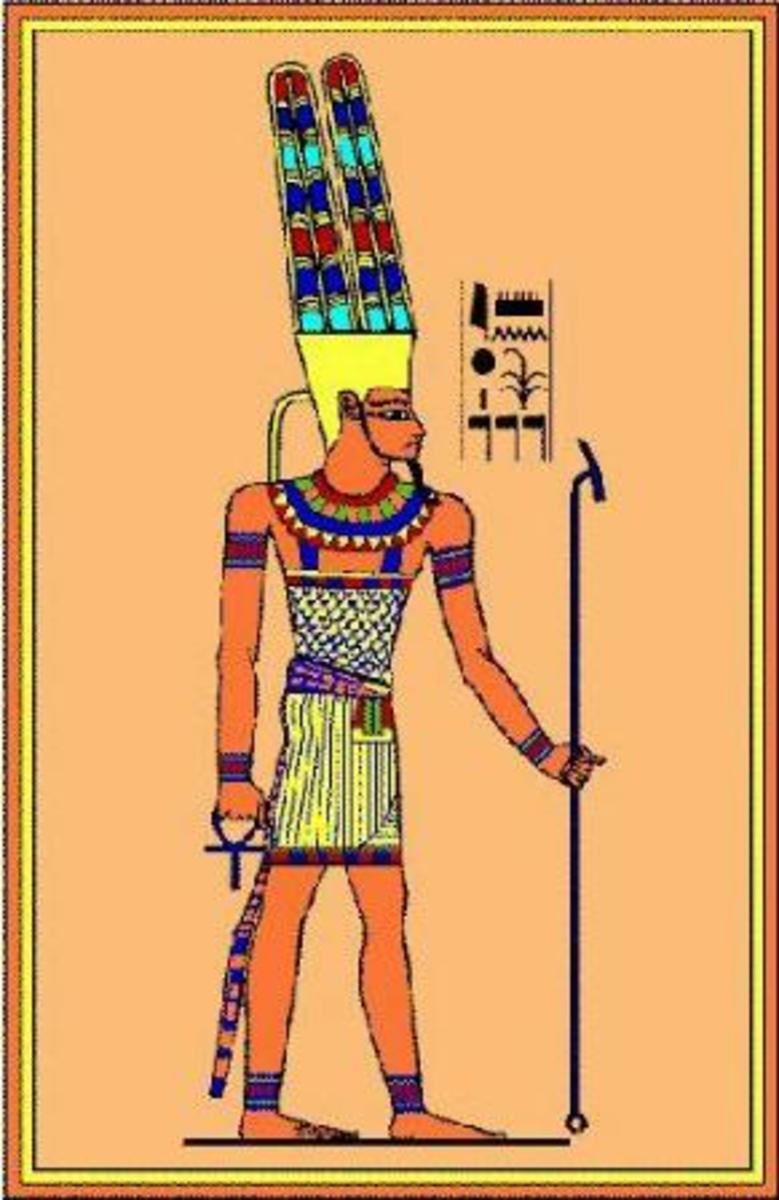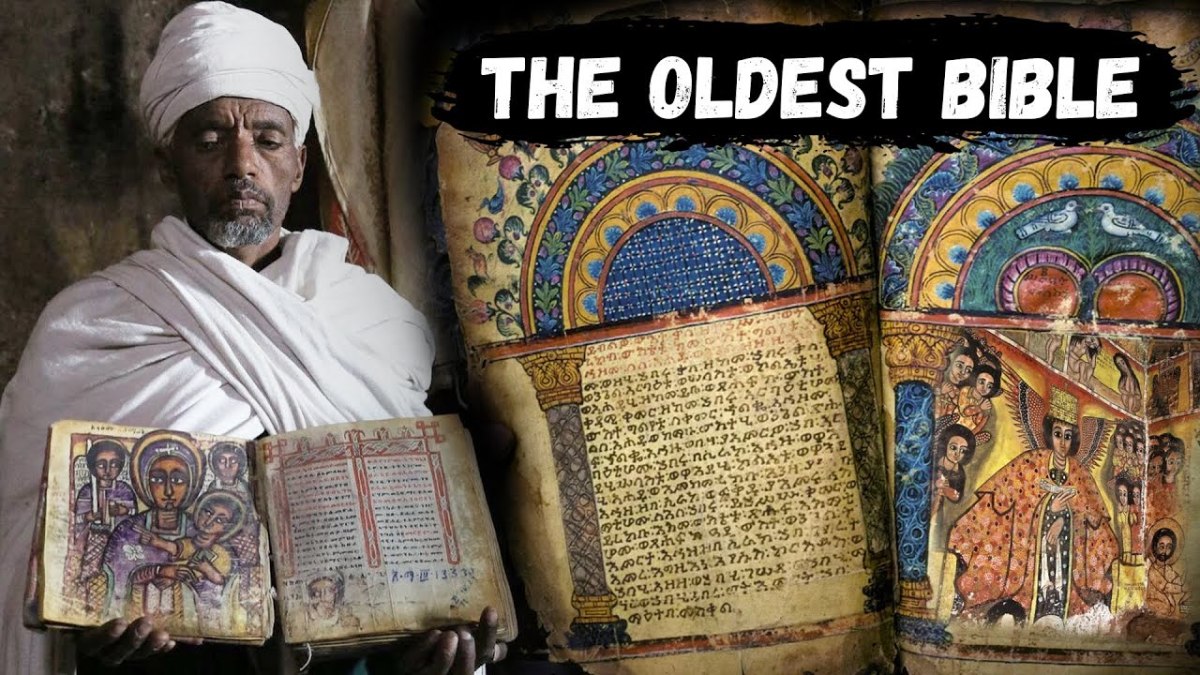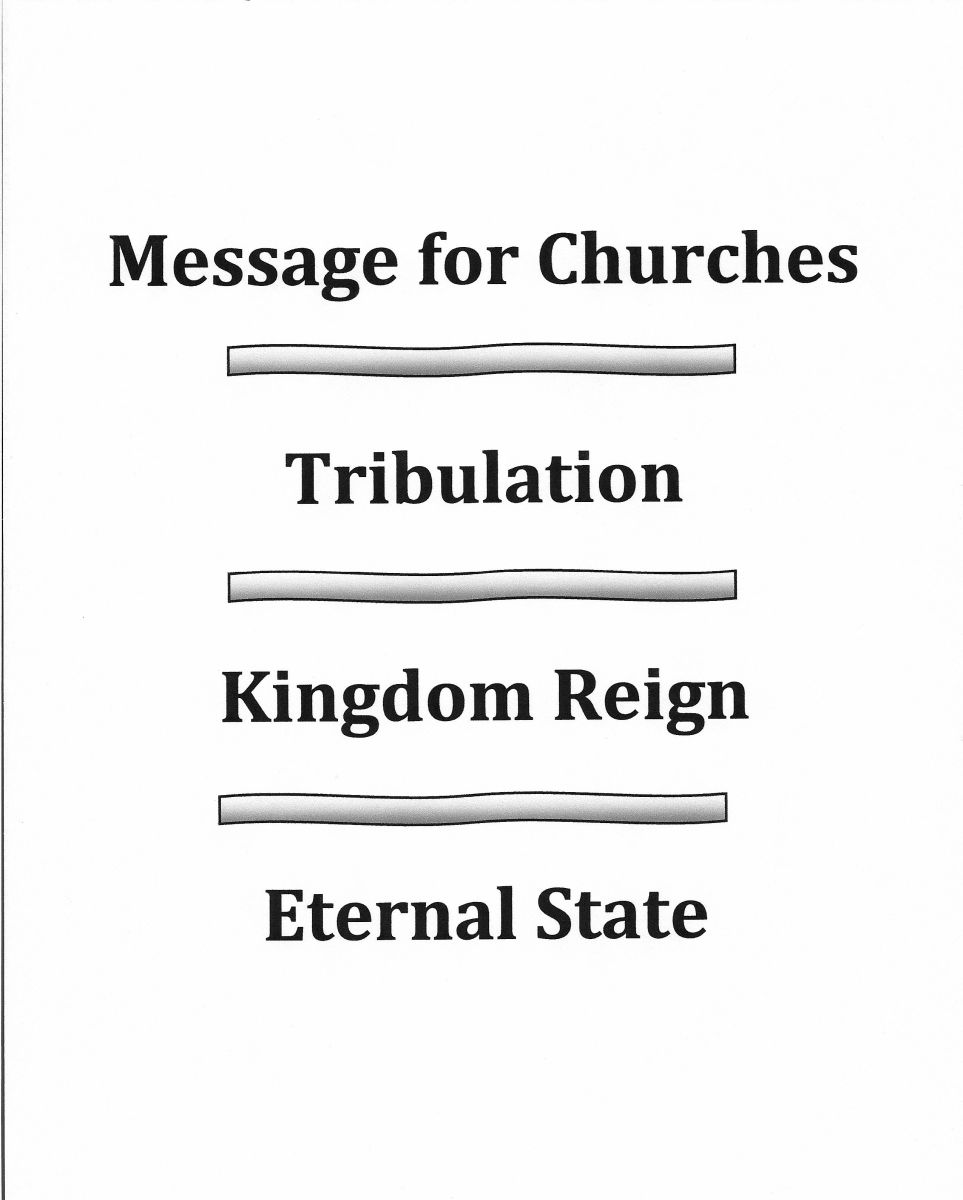Violence in the Bible: The Execution of the Wood-Gatherer (Old Testament / Hebrew Scriptures)
Making Sense of Biblical Violence?
The Bible ~ especially the 'Old Testament' ~ contains many, many stories of violence and cruelty. The execution of the wood-gatherer is one of them.
Though the Bible is the book from which we are supposed to gain our sense of morality, there is much, within its pages, which many of us, today, would consider highly immoral, unjust and downright unacceptable.
The most surprising aspect of this is that the perpetrator of these ~ often murderous ~ acts is reported as being our loving creator father God.
How should we make sense of this?
Why do Christians accept this?
How can Christians expect atheists to convert, or hope that agnostics will come down on their side of the fence, when the scriptures, which they regard with awe, contain such horrific stories about the 'God', whom they love, worship and adore?


A Response: Led By Another Hub
I have already written about the slaughter of the Amalekite babies and other issues. Here, I shall look at the execution of the Wood-Gatherer ~ the killing of a man, described in Numbers 15, whose sin was to collect firewood, in the wilderness, on the wrong day.
I was led to these verses by 'brotheryochanan', who has written a hub, on the same subject, but from a different angle ~ 'Man who gathered sticks on a Sabbath' (Link below).
'To begin with, I read only the Biblical verses that were quoted, as I did not wish the initial part of my hub to be influenced by another author's writing.
After completing part one of my hub, I then read brotheryochanan's piece ~ and I include my response in part two.

Copyright
This article ~ Copyright Tricia Mason. All Rights Reserved. Thank You!
Please excuse any typos! Thank you!

'Holy Bible'
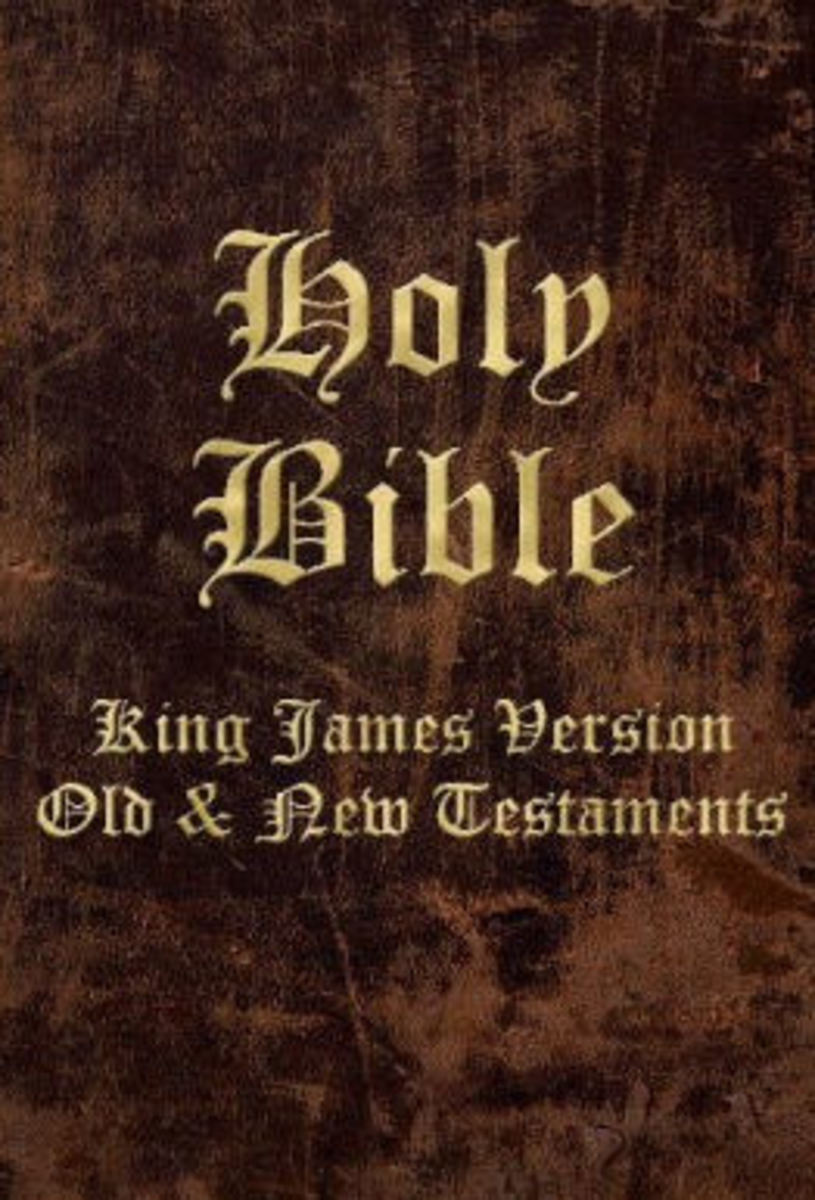
Sabbath Breaker Put to Death - Numbers 15:32-36
Here is a brief quote from the 'New International Version' of the Bible:
'While the Israelites were in the wilderness, a man was found gathering wood on the Sabbath day. Those who found him gathering wood brought him to Moses and Aaron and the whole assembly, and they kept him in custody, because it was not clear what should be done to him. Then the LORD said to Moses, “The man must die. The whole assembly must stone him outside the camp.” So the assembly took him outside the camp and stoned him to death, as the LORD commanded Moses.'
And for those who prefer the 'King James Version', here are the same verses again:
'And while the children of Israel were in the wilderness, they found a man that gathered sticks upon the sabbath day. And they that found him gathering sticks brought him unto Moses and Aaron, and unto all the congregation. And they put him in ward, because it was not declared what should be done to him. And the LORD said unto Moses, The man shall be surely put to death: all the congregation shall stone him with stones without the camp. And all the congregation brought him without the camp, and stoned him with stones, and he died; as the LORD commanded Moses.'

'Decalogue Parchment' - Jekuthiel Sofer - 1768

The 'Sabbath Day' Commandment
Exodus 20: 8-11 ~ King James Version
'Remember the sabbath day, to keep it holy.
'Six days shalt thou labour, and do all thy work:
'But the seventh day is the sabbath of the LORD thy God: in it thou shalt not do any work, thou, nor thy son, nor thy daughter, thy manservant, nor thy maidservant, nor thy cattle, nor thy stranger that is within thy gates:
'For in six days the LORD made heaven and earth, the sea, and all that in them is, and rested the seventh day: wherefore the LORD blessed the sabbath day, and hallowed it.'
*
Deuteronomy 5: 12-14 ~ King James Version
'Keep the sabbath day to sanctify it, as the LORD thy God hath commanded thee.
'Six days thou shalt labour, and do all thy work:
'But the seventh day is the sabbath of the LORD thy God: in it thou shalt not do any work, thou, nor thy son, nor thy daughter, nor thy manservant, nor thy maidservant, nor thine ox, nor thine ass, nor any of thy cattle, nor thy stranger that is within thy gates; that thy manservant and thy maidservant may rest as well as thou'.

PART ONE
My response to Numbers 15:32-36
Who and Why?
So, a man was gathering sticks on the Sabbath, for some reason.
We are not told the reason ~ indeed we are not told anything about this man.
Was he young, or old?
Why had he chosen to gather fuel on the Sabbath?
Did he realise that this was considered 'wrong' in his culture?
Did he need fuel, because he was cold and hungry?
Did he have a sick wife, or child, or parent, who needed to be kept warm and given hot food?
Had they no fuel to cook with?
Or did he intend to sell the wood, to those who had no fuel the following morning, and make a profit out of those who had kept the Sabbath, and run out of wood?
Was the execution of the wood-gatherer strictly necessary?

This Wood-Gatherer's Intentions - Good or Bad?
We don't know.
Did they know?
Did they check?
Did they care?
They kept him locked up, because they didn't know what to do with him ~ did they ask him for an explanation while he was there?
We don't know.
Why aren't we told more about this?
Would a reasonable explanation have made any difference?

Moses - Rembrandt van Rijn - 1659
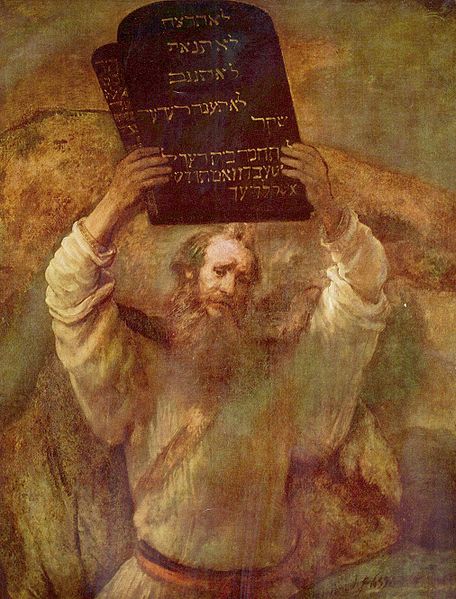
Moses said ...
Moses said that the wood-collector had to be executed.
Moses said that God had ~ apparently ~ ordered it.
Did God really order it, or did Moses just say that he had?
Moses had a lot of people to control ~ 'God's laws' must have helped him ~ and executing anyone who disobeyed would have helped him to retain authority and keep control (just as the Firing Squad at Dawn Executions of the shell-shocked, in World War One, were intended to keep discipline).
Maybe this death was 'necessary' for keeping things organised and for preventing chaos.
But was it fair or right?

Judging the 'Unjudgeable' ?
It is difficult ~ impossible, even ~ to judge the past. 'The past is another country', as they say. 'Hindsight is a wonderful thing', they also say. There is no point in judging a Middle Eastern ancient tribe. Everything was different there and then.
However, though this supposedly happened long ago and far away, we are told that it was an order from God!
God is, apparently, omni-everything. He is eternal. He is the same super-being, whom Christians and Jews still worship today.
In this case, it cannot be considered a thing of the past. God is said to be of the past, present and the future.
Thus, we can judge these actions, because they are reported to be the actions of the one true God, who is present and unchanging ~ with us, today, as then.

An Evil Law-Breaker - Or Just A Law-Breaker?!
Did God see something evil in the heart of the wood-gatherer, or was he executed simply for gathering wood?
Was he 'a bad person', or simply a person who broke an arbitrary law?
Is the law, to keep the Sabbath, and do no work upon that day, a fair one?
I shall repeat that question, with a slight modification:
Is the law, to keep the Sabbath, and do no work upon that day ~ or risk death ~ a fair one?
If it were right, then, to execute someone, for collecting wood on the Sabbath, then what about now?
Should those who gather firewood ~ or food, or anything else, for that matter ~ on a Sunday, be put on death row?
Indeed, which day should it be ~ because Saturday is the traditional 'Sabbath', not Sunday?
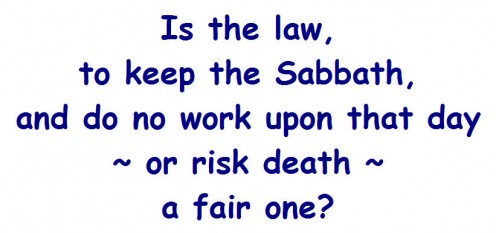

Capital Punishment - The Death Penalty
In the UK, there is no death penalty, but, when it last existed, it was for murder only.
Those who support capital punishment, usually think that it might be acceptable for certain murders and, possibly, for some particularly horrific assaults.
I cannot believe that anyone in their right mind would support the death penalty for gathering fuel ~ filling up the car's petrol tank, perhaps? ~ on a Saturday or Sunday.
This would be considered outrageous and immoral!
Yet we, supposedly, receive our sense of morality from God?!
We supposedly receive all knowledge of morality from God's word: The Bible!

Truth and Sense in the Bible ??
This makes no sense.
As I have said, elsewhere, God may or may not exist, but the Bible simply gives us folk tales, based on ancient cultural beliefs.
The Bible does not give us the reality of any God who may ~ or may not ~ exist.
Why would God ~ the creator, the super-being, who made us in his image ~ want to keep destroying his 'children'?
'He', supposedly, loves his creation
He gives them brains, provides them with free will and intelligence ~ then executes them, or punishes them in eternal hellfire, for using the free will he allows them, and the brains he created for them!
No!
God may or may not exist, but I cannot believe that he is the vengeful 'monster' described in some parts of the 'Old Testament'.
If God does exist, then the Bible does 'him' no favours!

PART TWO
My response to:
'The Man who Gathered Sticks on a Sabbath' by Brotheryochanan.
(Link below)
My summary of: 'The Man who Gathered Sticks on a Sabbath'
I hope that I have understood, and interpreted, Brotheryochanan's thoughts correctly.
The author, Brotheryochanan, correctly states that the stick-collector's story is brief ~ and it is most definitely lacking in detail ~ but he believes that we can read between the lines, when it comes to this man.
He notes that:
~ The man has no family, since no-one is named; there is no genealogy, which is unusual; he is given no name, nor even a description via his trade.
From there, he deduces that this man may have lost his loved ones and, consequently, may have become bitter and may have lost his faith in God. If this were the case, then God's laws may no longer have meant anything to him.
He also suggests that, since he seems to have no family, or connections, then this man may have been very 'independent' ~ providing for himself, and not relying on others ~ or on God. Possibly, this could have passed from not relying on God, to not respecting, or feeling the need for, God. He might have been a generally decent person, but not one who follows God, particularly.
Thus the author suggests that this man may either have ceased to love and trust God, or may have ceased to care very much about God.
Either way, he broke God's law.
The people didn't lynch him; they only arrested him.
Moses told them the verdict.
"God pronounced judgment" ~ and, for cutting wood on the Sabbath, this man had to die.

Related Reading - The Pentateuch
A Moral to be Found?
I discovered very little about this twig-collecting 'villain', except that he belonged to the tribe of Israelites, led by Moses; that he was male; that he collected wood on the Sabbath ~ and, thus, that he was a law-breaker.
However, the author, Brotheryochanan, sees a choice of full stories ~ with a moral:
1). A grief-stricken man, who has given up on everything ~ even God ~ feels unloved, alone and without purpose. But, as a member of the Hebrews, God's chosen people, who had been given rules by God, and was watched over by God, he should have realised that he was not unloved, alone and without purpose. He should have known that, with God's love, help and support, he could have recovered. It seems, though, that he rejected God, who would have been there for him, whenever he was needed.
Brotheryochanan asks Believers to consider whether their faith ~ their belief ~ has ever been shaken to the core, by apparently insurmountable difficulties, such as grief.
2). The author also comments on the man's response to Sabbath rules, which 'are strictly enforced'. This man must have known the law, and the potential consequences for disobedience, so why would he break the rules? Even if he were an independent sort of person, he would have known that Sabbath rules were God's rules, and that no man should break any rule given by God. He should have realised that God rules on Earth and on high, for all eternity, and he should have been leading his life God's way ~ not his way. Had he grown self important as well as independent?
Brotheryochanan asks Believers to consider whether they know any apparently pleasant and polite, but independent, people, who are 'self reliant' and 'self important', to the extent that they feel no need to 'drag God into' their lives.
The moral seems to be that mankind must allow God into their lives and allow him to rule their lives ~ otherwise they 'breach the qualifications .... for (everlasting) life'. [Brotheryochanan]
The moral in Brief:
Rejecting God's laws ~ no matter how trivial they may seem ~ will result in spiritual, if not physical, death.
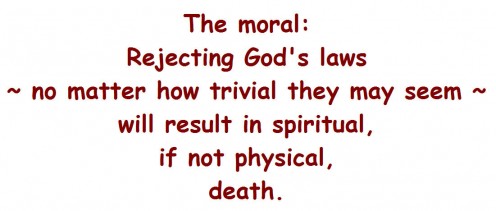
The Bible and Bible Companions
Rejecting God's Laws Will Result in Death.
Yes, it certainly seems that rejecting any of God's laws, even the apparently trivial ones, resulted in physical death under Moses ~ whether it also results in spiritual death, seems questionable.
I certainly agree that this is the moral of the story, as presented by Brotheryochanan, who feels that the execution 'represents the end time judgment of God', who will 'recompense' people for their behaviour 'according to their own hearts'.
However, I am not so sure that these laws were given by God. They could have been devised by Moses, in order to help him take charge of a huge number of people. Rules are vital in such situations.
In the Book of Numbers, I think that the moral is simply this: rejecting God's laws ~ no matter how trivial they may seem ~ will result in physical death.
Because, if rules were to be useful, then they had to be kept.
Thus, if God supposedly, said that anyone breaking his commandments should die, then Moses had to ensure that they did die. If a punishment is threatened, then it has to be carried out, when rules are broken ~ that is, if those rules are to remain effective.
The punishment for breaking those rules may have seemed unjust ~ death, regardless of whether one committed a heinous murder, or simply collected firewood on the Sabbath.
However, in the case of a tribal leader, control had to be kept, and all laws had to be obeyed. Thus the only viable punishment would have been execution. This way all rules would be kept, easily, because people would be too frightened to break them ~ and anyone, who considered even the slightest breach, and might thus be a potential mutiny-leader, would be put to death. This would rid the tribe of trouble-makers and act as a deterrent.
In this story, the tribe did not lynch the law-breaker, but took him to Moses and Aaron. They had no problem stoning him to death, though. They didn't want trouble, either, it seems ~ or maybe they were too frightened to say 'no' to Moses ~ and to 'God'.

PART THREE
Other Possibilies ~ and Conclusions
Other Stories
With so little information to go on, we can come up with any number of stories, which support our own beliefs ~ or lack thereof.
Why did a member of the Hebrews deliberately flout God's law, by collecting wood on the Sabbath?
I have already suggested that he may have had urgent need of fuel, for heating or cooking, perhaps. If it is true that he was independent and alone, then he may not have had anyone whose fire he could share.
He may not have known about the Sabbath rules. Perhaps he suffered memory loss or was mentally challenged?
Perhaps he was disliked by the people, and decided to go and collect wood by himself, while no-one else was doing so.
It may be that he did not believe in the God of Moses. It has been shown that many Hebrews followed Pagan religions. Even the Bible tells us that the Hebrews revered a golden calf.
Perhaps he was ill and depressed and didn't care what happened to him.
Maybe he wanted to challenge the rules, to see if Moses would actually kill someone, just for collecting wood.
It could be that the man was a trouble-maker ~ or even that he was something of a stranger in their midst ~ and that he was not trusted, so the Sabbath rule-breaking provided a suitable 'reason' to be rid of hiim.
It is possible that the story was simply invented ~ as a sort of parable, to warn the people not to break rules.

'Adoration of the Golden Calf'
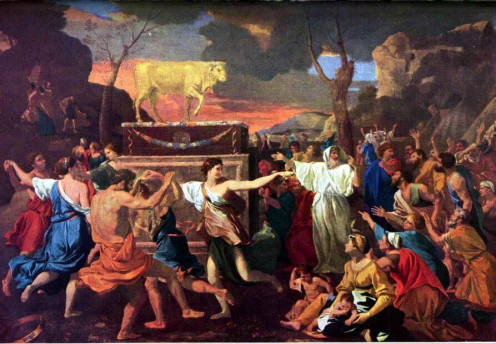
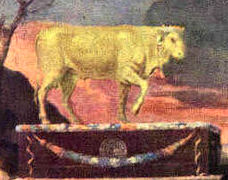
Exodus 32: The Golden Calf
Exodus 32;1-5 (King James Version)
'And when the people saw that Moses delayed to come down out of the mount, the people gathered themselves together unto Aaron, and said unto him, Up, make us gods, which shall go before us; for as for this Moses, the man that brought us up out of the land of Egypt, we wot not what is become of him. And Aaron said unto them, Break off the golden earrings, which are in the ears of your wives, of your sons, and of your daughters, and bring them unto me.
'And all the people brake off the golden earrings which were in their ears, and brought them unto Aaron. And he received them at their hand, and fashioned it with a graving tool, after he had made it a molten calf: and they said, These be thy gods, O Israel, which brought thee up out of the land of Egypt.
'And when Aaron saw it, he built an altar before it; and Aaron made proclamation, and said, To morrow is a feast to the LORD.'
*
The cult of the bull was once prominent in the Eastern Mediterranean area. This seems to be a reflection of it. Even the brother of Moses was involved in this pagan event!

We Do Not Know
Why did this man ~ in Numbers 15 ~ break the law?
The truth is that we simply do not know.
We do not have any reliable answers.
These stories were written down a long time ago and were probably based on oral traditions that had changed over the years.
We don't know who wrote them, or what actually happened.

Horrors and Doubts
Genuine Descriptions of God?
Did God really order babies to be slaughtered and women to be abused?
Did he really drown thousands?
Did he really allow 'Satan' to destroy devout Job's life?
Did he really favour Lot's dysfunctional family?
Did he really order the execution of the wood-gatherer?
Or did it just appear that way?
If people believe that their lives are controlled, or influenced, by their personal God, then, whatever happens, events would have to be assigned to God.
This is what happened with the Hebrews / Israelites.
It seems highly likely that they chose their personal God, and decided that he had chosen them; that they perceived him in their own image, and decided that he had created them accordingly.
Their myths, history, ideas, beliefs, etc, etc, would all then fit into this pattern.
Their resulting stories ~ including the one about the execution of the wood-gatherer ~ were then recorded in various books that would, eventually, become 'The Bible'; specifically the Old Testament, or 'Hebrew Scriptures'.
They are fascinating stories, of a time long past ~ but it is highly unlikely that they reflect any truth about any possible God.
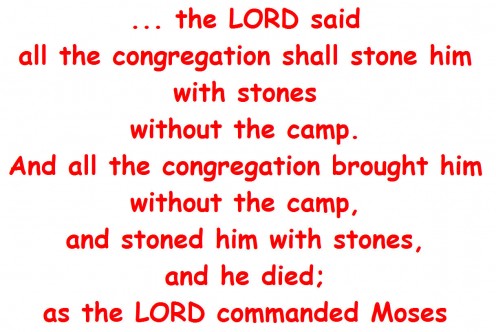
Other Relevant Hubs
- Monotheism and the Problem of Suffering
By titen-sxull - The Problem of Suffering
By parrster - Did God Foresee this
By parrster - The Bible - Its Own Best Defense
By liftandsoar - Those Troubling Scriptures
By liftandsoar - Those "Disgusting" Scriptures
By liftandsoar - The God who Makes us Suffer "on a Whim"?
By liftandsoar
My Related Hubs:
- The Destruction of the Babies and Children of Amalek ~ The Slaughter of the Amalekites
Picture the pregnant women having a sword thrust into their bellies. Picture the mothers, as they see their toddlers cut down by a sword, in the hand of a huge fighting man. Picture the new-borns, ripped apart, with their mothers, as they suckle. - 'God is Love' by Percy Dearmer ~ Analysis of a Popular Hymn
- Genghis (Chingis) Khan ~ and The Bible
- QUOTE: "How could the Earth, and all Creation, be so Beautiful, without a Creator?"
Book: Drunk with Blood - God's Killings in the Bible





